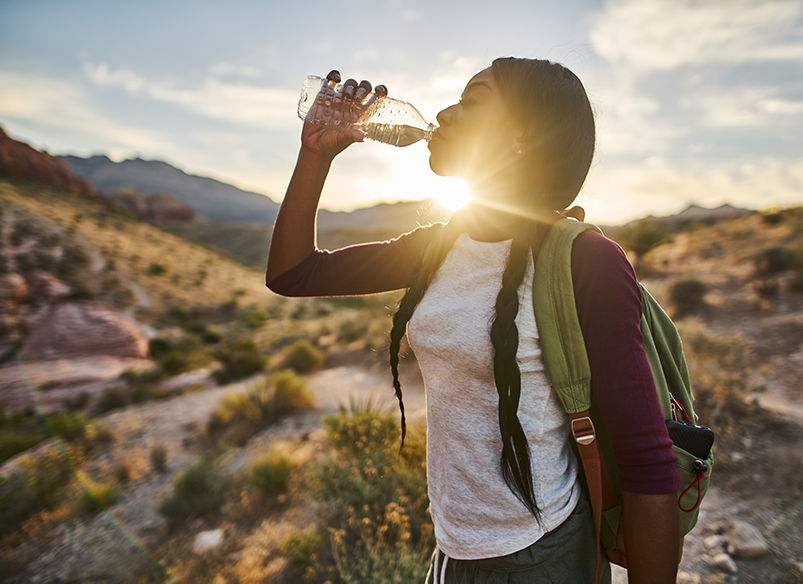Medically Reviewed by Carlos A. Baez, M.D.

Your body is about 60 percent water. Water is crucial to every single bodily function. So why is it so easy to overlook in our daily lives?
Often, when people get a headache or begin to feel weak, they mistake this sensation of thirst as a need to eat or rest. It’s also not uncommon to reach for a sugary soda or caffeinated drink instead of water, which can make dehydration worse.
Health effects of chronic dehydration
You may think that being slightly dehydrated isn’t a big deal, but it is. More than 75 percent of Americans are chronically dehydrated, drinking an average of just 2.5 glasses of water per day. Did you know 2.5 cups is the approximate amount we lose through normal bodily functions like breathing, perspiring and having urine and bowel movements each day? This doesn’t include doing things like walking, talking, lifting or the million other things your body does.
If you’re wondering how it’s possible to be dehydrated even when you don’t feel thirsty, it’s important to understand the lack of thirst recognition decreases with age. People also tend to misunderstand or suppress the sensation of thirst. Children are also at risk for chronic dehydration as they are unable to differentiate between thirst, hunger or fatigue.
For your body to function properly, it’s important to replenish your water supply daily so you can avoid the negative effects of dehydration. If you’re chronically dehydrated, you can develop other health conditions. Symptoms like nausea, headaches, dizziness and muscle cramping may continue or worsen as your dehydration progresses. Ongoing, or chronic, dehydration has been linked to the following conditions:
- Decreased kidney function
- Kidney stones
- Hypertension
- Urinary tract infections
- Intestinal failure
- Dementia
If these conditions seem unsettling, consider this: Scientists are just beginning to understand the many negative effects chronic dehydration has on our bodies.
Signs and symptoms of chronic dehydration
When you’re dehydrated, you may experience one or more of the following symptoms:
- Dry or flaky skin
- Constipation
- Constant fatigue
- Dark-colored urine
- Ongoing muscle weakness or fatigue
- Dizziness
- Frequent headaches
Additionally, your doctor may look for things like concentrated blood volume, abnormal electrolyte levels and reduced kidney function over time.
Drinking more water can make you healthier
Here are 12 science-based health benefits of drinking enough water every day:
- Joints
Water helps keep the joints lubricated. Cartilage, which is found in the joints and discs of the spine, is about 80 percent water. Chronic dehydration can reduce the joints’ ability to absorb shock (e.g. walking running, cycling or hiking), which can lead to joint pain and stiffness.
- Saliva and mucus
Saliva is important for digestion and helps keep the mouth, nose and eyes moist, which can help prevent friction and damage. Drinking enough water also helps keep the mouth clean, which can help prevent things like gum disease and tooth decay.
- Oxygenated blood
Blood is more than 90 percent water, so the more hydrated someone is, the more efficiently blood can move through their body and carry oxygen to organs, muscles and tissues.
- Skin health and elasticity
When a person is chronically dehydrated, they have a much higher risk of skin disorders and premature wrinkling.
- Brain, spinal cord and other sensitive tissues
Water cushions the brain, spinal cord and other sensitive tissues. When there isn’t enough water, it can negatively impact the structure and function of the brain. Water also helps in the production of hormones and neurotransmitters, which control the ability to reason and think.
- Body temperature
Some scientists have suggested that when there isn’t enough water in the body, heat storage increases, diminishing a person’s ability to tolerate heat strain. Moreover, if a person is dehydrated, the body is unable to cool itself effectively using perspiration.
- Digestion
The bowels need water to function properly. Dehydration can lead to things like constipation and an overly acidic stomach, which increases the risk of heartburn and stomach ulcers.
- Body waste
Water is essential for flushing toxins out of the body through perspiration and voiding (e.g., urine and feces).
- Blood pressure
Lack of water can lead to thicker blood, which increases blood pressure.
- Kidneys
The kidneys help clean the blood and regulate fluid in the body. Insufficient water can lead to kidney stones and other health problems.
- Physical performance
Dehydration may reduce physical performance when activities are 30 minutes or longer.
- Weight loss
Drinking a glass of water before meals can help prevent overeating by supporting a sense of fullness.
How to drink more water throughout the day
Learning how to drink more water can be boring and repetitive, but these ten easy strategies may help you drink more water throughout the day, easily:
- Start your mornings with water
Drink a glass of warm water, flavored with lemon, each morning soon after you wake up and before eating breakfast to encourage healthy digestion and hydration.
- Give your water a fruity upgrade
There are many things you can add to water to make it more fun to drink. Try infusing it with things like grapefruit, lemons, strawberries, cucumbers, ginger, basil, mint or even lavender until you find one you love.
- Drink a glass after every bathroom break
Making it a habit to drink a glass of water after every bathroom break will help keep your body healthy and free of toxins (because you’ll be voiding more often) and help you drink more water (because you’re voiding more often).
- Drink water before meals
Another good habit to build is drinking a glass of water before sitting down to a meal. This will help you prevent overeating, which is also helpful if you’re trying to lose weight.
- Try a tracker app
Drinking more water can be easier (and more fun) when you do it with an app like Daily Water Free. Just download, set your reminders and stay hydrated while you scroll.
- Keep a large container of water nearby
If you’re like most people, having a constant reminder to drink water is a good way to drink more water. Place a large container at your workstation, kitchen counter or anywhere you spend the majority of your day. The visual cue will help you remember to stay hydrated.
- Use a marked water bottle
If you make lists just to cross things off of it, this one might be for you. Track your water throughout the day on a marked water bottle. It’s a great way to see your progress and encourage you to stay on track. You can also set mini-goals or targets throughout the day to stay on track.
- Dilute sugary drinks with water and ice
If you’re drinking something sweet like iced tea or lemonade, try watering down your beverage with water and ice to increase your intake of water.
- Reach for sparkling water or mineral water instead of soda
The sugar and caffeine in sodas can worsen symptoms of dehydration, so try fizzy alternatives instead. Sparkling water with a squeeze of lime may satisfy your soda craving, and it’ll help keep you better hydrated.
- Eat water-rich foods
A lot of people forget to factor in food to their daily intake of water, but there are plenty of delicious options that can help with hydration like watermelon, cucumber, zucchini, strawberries, peaches and lettuce. Try replacing your regular lunch with a colorful salad to help you stay healthy and hydrated.
- One glass of water to one glass of alcohol
If you choose to drink alcoholic beverages, please do so responsibly and be sure to alternate one glass of water to every one glass of alcohol. Not only will this help prevent hangovers, but it will also help keep you hydrated.
- Add in reps of water with your workout
When you’re at the gym, it can be easy to focus on your workout and forget to stay hydrated. Make a deal with yourself that after each exercise (or a set number of minutes) you stop to hydrate. It will help boost your performance and aid in recovery.
If you or a loved one is exhibiting signs of severe dehydration, seek medical attention as soon as possible to prevent further complications like stroke or seizures. Call Pomona Valley Health Centers at 909-378-9512 to find out how we can help you safely and quickly rehydrate so you can feel better fast.





